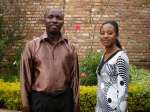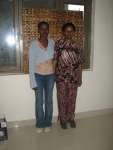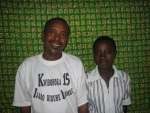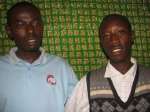Wherny Namara & Uwizeyimana Consolatrice
Through conversation, Consolatrice is able to find peace and strengthen her relationship with members of the community. Wherny helps her understand that hatred will not be helpful for the future of Rwanda.
"I developed a sense of love, the love of my enemies. I felt like I'm obliged, I felt like I have to pray for even those who hate me according to the story we shared." Uwizeyimana Consolatrice
Mukakayange Veronique & Muyisenge Onaan
Muyisenge Onaan wants to learn about his family history and the stories his parents passed down to his older sister, Mukakayange Veronique. Mukakayange Veronique recalls the loss of their mother in a violent bombing, finding a way to build a relationship through song, and forgiveness. By discussing the manner in which they personally survived hardship, Muyisenge Onaan and Mukakayange Veronique imagine solutions for a peaceful future for Rwanda.
"There is a proverb in Kinyarwanda which says 'A good neighbor is better than a distant relative'." Mukakayange Veronique
Umuraza Nassim & Isimbi Tresor
Because he seems older than his years and keeps asking her, Umuraza Nassim, a poet and peacemaker, finally decides to tell her son, Isimbi Tresor, the truth about what happened to his grandparents during the genocide. These memories were so painful and identities of the killers still remain unknown, so she has been unable to talk to her son about her family’s history until now. In telling her story, Umuraza Nassim describes the hardships that she went through during and after the genocide, and also explains the fate of Tutsis and the events leading up to the genocide.
Rwamucyo Denys & Hadasa Esther
Hadasa Esther respects her uncle, Rwamucyo Denys, and wants to know his life history. Rwamucyo Denys tells her about the identity cards that they were forced to carry before the war and how his family fled to Burundi to escape violence. Hadasa Esther asks her uncle many questions about the nature of ethnic discrimination and he reminds her that “All of us are Rwandese” and should be united. Despite the many hardships Rwamucyo Denys has been through, he wants his niece to stay positive and always concentrate on doing what is right.
Musabyimana Epiphanie & Hakizimana Justin
Hakizimana Justin and Musabyimana Epiphanie are siblings who lost their parents during the genocide. Since Hakizimana Justin was very young at the time, he wants his older sister to tell him about their family, ethnic discrimination, and the many hardships that she went through after the genocide. Since he has no other adult to turn to, Hakizimana Justin also asks Musayimana Epiphanie for advice about how he should behave in different settings. As any good older sister would do, she advises him on the proper way to live his life.
Tabaruka Jeannine & Unnultoza Christine
Tabaruka Jeannine and Unnultoza Christine discuss the reason that Unnultoza Christine grew up without her father and brother. Unnultoza Christine has several questions surrounding their deaths during the genocide. Tabaruka Jeannine does her best to answer these questions so that her daughter may understand her family's history, but more importantly so she can move past the harsh realities of Rwanda's past and begin planning her future. Tabaruka Jeannine relates her past to help Unnultoza Christine realize that she is not alone in her struggles and that they are surmountable.
Musabyimouna Edith & Lemurunyai Sandrine
Musabyimouna Edith tells her daughter how she went from being a lazy, spoiled daughter, to a hardworking survivor and mother. She describes how she was able to survive the genocide partially through her own willingness to change, but largely through the benevolence of strangers who were willing to hide, clothe and feed her during the violence. In order to survive, Musabyimouna Edith relied on strangers to conceal her identity and endured several close encounters with potentially violent individuals.
Mukansanze Imfura Chantal & Turatsinze Jimmy
Mukansanze Imfura Chantal explains to Turatsinze Jimmy how he became an orphan and how he got to where he is today. She urges him to continue his education and, equally importantly, to treat everyone as equals, regardless of ethnicity, wealth, or status, not only for himself, but for the future of the country. Turatsinze Jimmy describes his hazy memories as a young boy about the origins of genocide—why did a plane crash start a war? Was there already a plan in place to start the killing? Has there always been a rift between ethnicities?
Sakindi Jean Marie Vianney & Sakindi Uwera Marie Rose
Sakindi Jean Marie Vianney and his daughter Sakindi Uwera Marie Rose use this opportunity to discuss the origins and causes of the 1994 genocide on both personal and national levels. Sakindi Jean Marie describes to Sakindi Uwera Marie Rose how close he and his wife came to death and what life was like in the years leading up to the genocide. They hid in closets, relied on the kindness of their neighbors, and turned to faith to keep them hopeful and lead them to forgiveness. Sakindi Uwera Marie Rose details how she and her classmates try to prevent conflict in their country.
Muhizi Jean Claude & Masengesho Jean de Dieu
Muhizi Jean Claude wants to inspire his friend Masengesho Jean de Dieu to be hopeful about the future by reflecting on how much has changed since his youth. Muhizi Jean Claude talks about how the segregation that existed in schools and how political instability contributed to the genocide. In answer to Masengesho Jean de Dieu’s question about ways for people to heal their emotional pain, Muhizi Jean Claude emphasizes youth breaking the cycle of ethnic discrimination.












